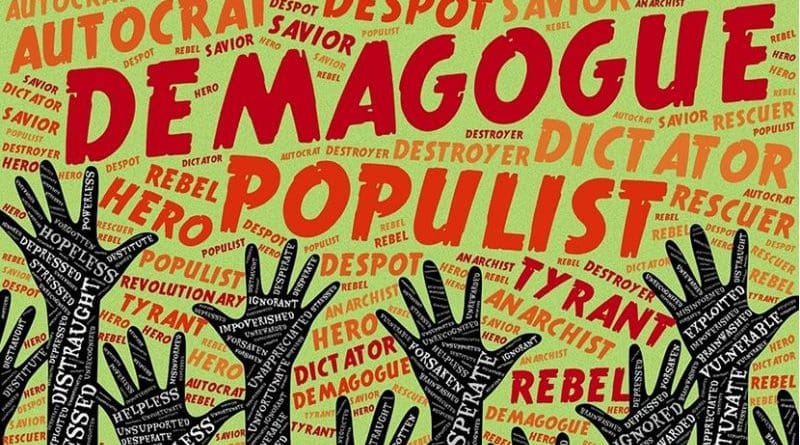The Global Threat Of Far-Right Politics – OpEd

The rise of far-right political movements is a significant global phenomenon that poses a considerable challenge to international freedom and security in the early 21st century. These movements, characterized by nationalist and xenophobic ideologies, often authoritarian, have gained traction not only in Europe but also in other parts of the world, including the United States, Brazil, and India. The implications of this shift are extensive, as they threaten the stability of democratic institutions, the integrity of international alliances, and the safeguarding of human rights.
Addressing this phenomenon requires a comprehensive approach that strengthens democratic values, promotes social inclusion, and fosters international collaboration. This essay argues that the global rise of far-right movements represents a critical threat to international freedom and security. Therefore, it is necessary to implement multifaceted strategies to mitigate their impact.
In various European countries, such as France, Germany, Italy, and Hungary, there has been a remarkable surge in popularity for far-right political parties. These movements take advantage of economic anxieties, cultural fears, and a perceived loss of national identity to garner support. Their rhetoric often includes strong anti-immigrant sentiments, calls for stricter border controls, and a desire to return to traditional values.
Similar trends can be observed beyond Europe, with far-right ideologies gaining traction in the United States, where figures like Donald Trump have reshaped the political landscape, and in Brazil, under the leadership of Jair Bolsonaro. In India, the rise of Hindu nationalism under the Bharatiya Janata Party (BJP), led by Prime Minister Narendra Modi, reflects a comparable shift. The appeal of these far-right parties lies in their ability to tap into widespread discontent. The combination of economic inequality, rapid globalization, and cultural shifts has left many individuals feeling marginalized and disillusioned with mainstream politics. The far-right presents a seemingly simple solution: a return to a more homogeneous and controlled society. However, this narrative fundamentally contradicts the principles of liberal democracy, which are founded on open and pluralistic societies and respect for human rights.
One of the most consequential outcomes of the rise of far-right movements is the potential degradation of democratic institutions. These movements often undermine the rule of law, challenge the autonomy of the judiciary, and strive to reduce the effectiveness of checks and balances. In Hungary, Prime Minister Viktor Orbán’s Fidesz party has systematically dismantled democratic safeguards, curtailed press freedom, and manipulated electoral laws to solidify its hold on power. Similar trends can be observed in Poland, where the Law and Justice Party (PiS) has sought to control the judiciary and restrict civil liberties. These actions not only endanger internal stability but also establish a worrisome precedent for other nations, eroding the global commitment to democratic governance.
The rise of the far right also directly threatens international alliances and cooperation. In Europe, far-right parties typically advocate for increased national sovereignty and oppose further integration within the European Union. This stance undermines the unity of the EU and weakens its ability to address collective challenges such as climate change, migration, and security threats. Brexit, largely fueled by nationalist sentiments, exemplifies the potential for far-right ideologies to disrupt international partnerships.
Outside of Europe, far-right leaders often adopt isolationist or unilaterally focused foreign policies, straining alliances and diminishing the effectiveness of international institutions. Additionally, the exclusionary and xenophobic policies of the far right have significant human rights implications. These movements frequently target refugees, immigrants, and marginalized groups, fostering an environment of intolerance and discrimination.
In the United States, the immigration policies of the Trump administration, including the controversial travel ban targeting certain majority-Muslim countries and the separation of migrant families at the border, have faced widespread criticism for violating human rights norms. In Brazil, President Bolsonaro’s rhetoric has incited violence against indigenous communities and environmental activists. Such policies not only harm vulnerable populations but also erode the global commitment to human rights and the principles enshrined in international law.
To effectively address the challenges posed by the surge of the far right, a multifaceted approach becomes imperative. Strengthening democratic institutions should be given the highest priority. This includes reinforcing the rule of law, ensuring judicial independence, and safeguarding freedom of the press. Education plays a vital role in promoting democratic values and fostering critical thinking. Citizens need to possess the necessary tools to identify and resist narratives that promote authoritarianism and xenophobia. Equally important is the promotion of inclusive policies that address the underlying causes of disenfranchisement. The existence of economic and social inequality provides fertile ground for far-right ideologies to flourish. Governments should devote themselves to implementing policies that encourage social cohesion, provide equal opportunities, and support marginalized communities. These initiatives can contribute to diminishing the appeal of far-right remedies and fostering the development of more resilient societies. Since far-right movements transcend national and international borders, collaboration is paramount in challenging them. Democratic nations must work together, share best practices, and coordinate efforts in combating extremism and providing mutual support in safeguarding democratic values. Public awareness campaigns also have a significant role to play in educating citizens about the perils of far-right ideologies and the significance of upholding democratic principles and human rights.
It is essential to closely monitor and regulate activities, especially online platforms. Social media has become a breeding ground for hate speech and extremist content. By increasing surveillance and regulating these platforms, the spread of harmful narratives can be prevented and vulnerable populations can be protected. The support provided to civil society organizations that promote human rights, diversity, and inclusion is also crucial. These organizations primarily lead efforts to counter far-right narratives and protect marginalized communities.
Addressing economic disparities is another crucial aspect. Globalization and technological advancements have resulted in significant economic shifts, leaving some regions and communities behind. Governments should implement policies aimed at supporting these areas, generating job opportunities that can mitigate the appeal of far-right ideologies.
In conclusion, the rising influence of the far right poses a significant threat to global freedom and security. Its nationalist, xenophobic, and authoritarian ideologies undermine democratic institutions, disrupt international alliances, and violate human rights norms. Addressing this challenge requires a comprehensive approach that strengthens democratic values, promotes social inclusion, and fosters international collaboration. By investing in education, implementing inclusive policies, and embracing cooperation, democratic nations can build more resilient societies and safeguard the principles of freedom and security for future generations.
The opinions expressed in this article are the author’s own.
References
- Mudde, Cas. The Far Right Today. Polity, 2019.
- Eatwell, Roger, and Matthew Goodwin. National Populism: The Revolt Against Liberal Democracy. Pelican, 2018.
- Mounk, Yascha. The People vs. Democracy: Why Our Freedom Is in Danger and How to Save It. Harvard University Press, 2018.
- Norris, Pippa, and Ronald Inglehart. Cultural Backlash: Trump, Brexit, and Authoritarian Populism. Cambridge University Press, 2019.
- Rydgren, Jens. The Oxford Handbook of the Radical Right. Oxford University Press, 2018.

Simon Hutagalung
Simon Hutagalung is a retired diplomat from the Indonesian Foreign Ministry and received his master's degree in political science and comparative politics from the City University of New York. The opinions expressed in his articles are his own.
No comments:
Post a Comment